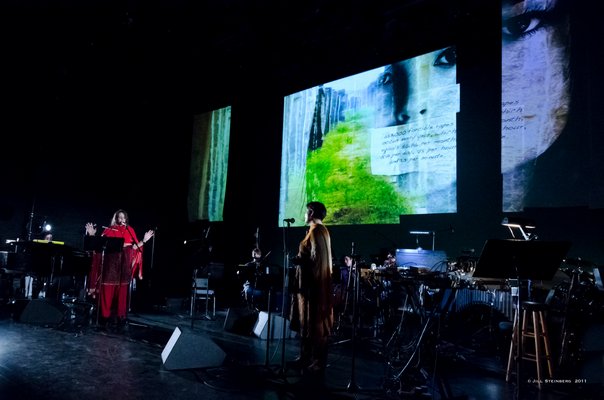
In 2002, Mukhtar Mai was an illiterate peasant living in a rural Pakistani village. Today, she is among the most influential female activists alive.
“Thumbprints,” a contemporary opera-theater work by Indian-American composer Kamala Sankaram and librettist Susan Yankowitz, tells Ms. Mai’s story—though it is not an easy one to hear.
As a cool breeze blew in from the open, third-floor windows of the Watermill Center, Ms. Sankaram, Ms. Yankowitz and director Rachel Dickstein sat barefoot around a white table littered with music scores and notes; a keyboard to the composer’s left. A working libretto and two thirds of the music written, the women still have much to do during their residency at the avant-garde creative laboratory, beginning with bringing in a handful of actors and designers who will breathe life into the women’s production this week.
“Where these guys are in their process, it’s important now to see it on its feet in some draft form, both so that they can hear it and respond to everything they’ve been doing,” the director said. “I’m very interested in working on pieces—whether operas or dances or plays—that tell stories about women’s identity in relationship to cultural constraints. And this is a pretty extreme example of that.”
Eleven years ago, Ms. Mai was living quietly in her native village, Meerwala, which is ruled by a group of feudal lords who owned everything and everyone, Ms. Yankowitz explained. One day, they came to the young woman and accused her 12-year-old brother of raping a girl in their tribe. The young woman was 21 and “rather promiscuous,” the writer said.
Tasked with asking for forgiveness, Ms. Mai visited the tribe and apologized to all of the men.
It wasn’t enough.
On the orders of a jirga—or tribal assembly—she was punished for her brother’s alleged crime.
“So a woman, as always, has to ask forgiveness in front of all the men of the tribe,” Ms. Yankowitz said.
As a result, Ms. Mai was gang raped. And then she was expected to commit suicide, per local tradition. Her brother was not punished.
But after being defiled, instead she defied her attackers and fought for justice.
“There’s so much mystery to me. It’s not really clear how someone changes and how she came to the decision to bring her rapists to court,” Ms. Yankowitz said of Ms. Mai’s decision to stand up and fight. “This is a woman who had never spoken to a policeman, who had never spoken to a judge, didn’t know what a lawyer was. She didn’t even know she had the right. She just wanted them to be punished for that they did to her.”
Suddenly, Ms. Mai’s very traditional, sheltered views were turned upside down, Ms. Sankaram explained, a concept the composer has explored with the score by melding Hindustani music with European opera as the activist delves further and further into the ideas and ways of thinking in the Western world.
The story has all the classic elements of an opera—notably heroes and villains, Ms. Dickstein pointed out—but in this case, the story is true.
“This is an idea you grow up with in my culture. When I would visit India, I was never allowed to go out by myself without a male escort,” Ms. Sankaram said. “It’s something that is always happening, but it’s just in the last year that it’s become this international story, with everything that’s going on in India. I hope that means there’s a sea change that’s occurring in the culture.”
The composer is witnessing a similar shift among the operatic culture, she said. With “Thumbprint,” Ms. Sankaram is modernizing opera by pushing the boundaries of voice and narrative while still using the antiquated medium—a trend she hopes will continue, she said.
“One of the difficulties opera is facing right now is people have this very codified way of thinking about it, not only the people who are making it, which is part of the problem,” Ms. Sankaram said. “It’s kind of stuck, in a way. It’s telling stories in the way you think you’re supposed to tell a story, which is never what it was supposed to be about.”
So, with her team, Ms. Sankaram is going to tell Ms. Mai’s story the way she wants: true to form, she said, while transcending culture, religion and gender with music.
An open rehearsal of “Thumbprint” by Kamala Sankaram and Susan Yankowitz, and directed by Rachel Dickstein, will be held on Sunday, June 9, from 6 to 7 p.m. at the Watermill Center in Water Mill. For more information, call 726-4628 or visit watermillcenter.org.